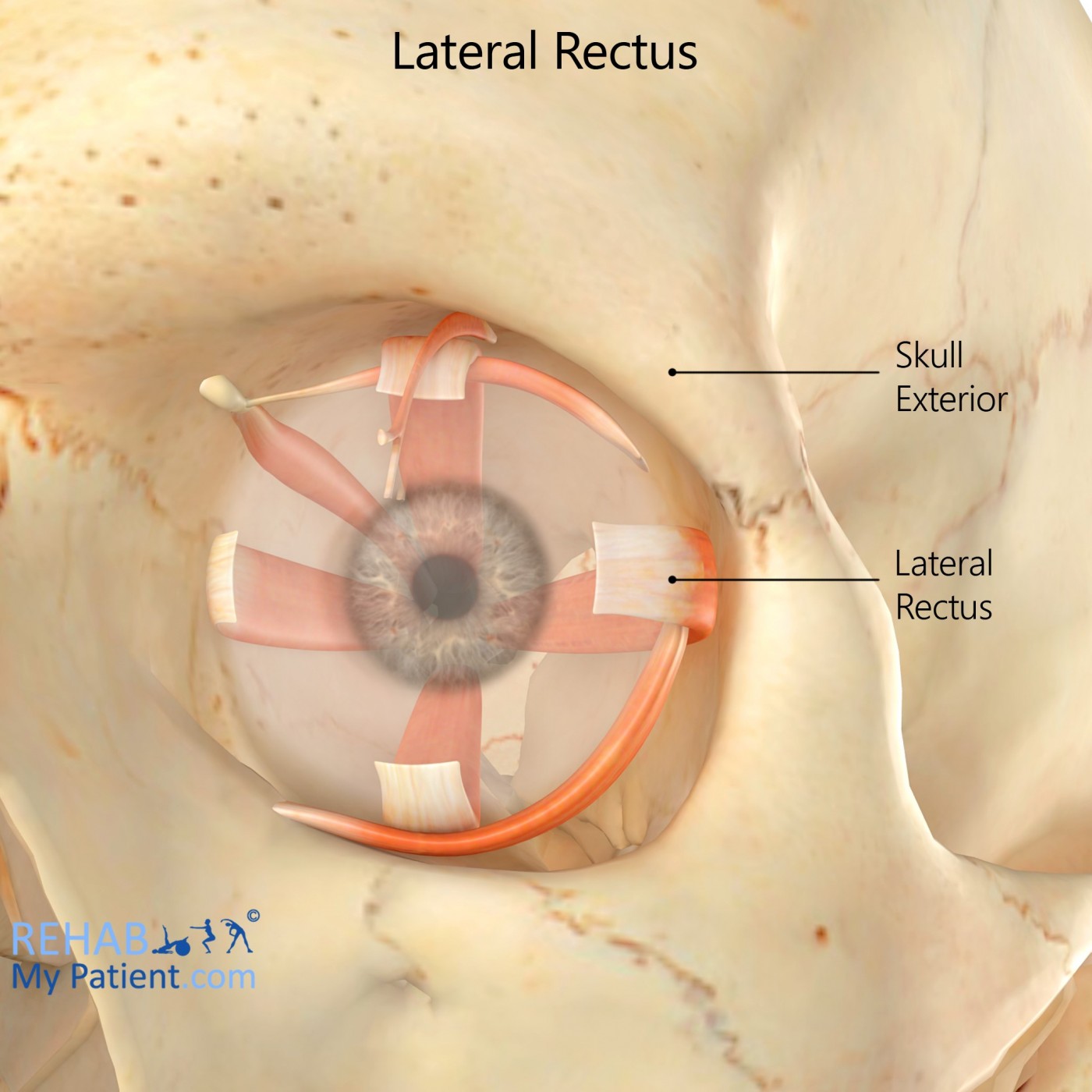Lateral Rectus
Posted on 24th Jul 2020 / Published in: Face

General information
Lateral rectus is a muscle in the orbit (eye) that controls movement.
Literal meaning
The side straight muscle (of the eye).
Interesting information
Lateral rectus is one of six extraocular muscles which include inferior rectus, medial rectus, superior rectus, inferior oblique, and superior oblique. These extraocular muscles are responsible for coordinating the complex and quick movements of the eye. Lateral rectus is the only extraocular muscle that is innervated by the abducens nerve (C6).
The primary function of lateral rectus is abduction, or outward movement, of the eye. Therefore, it can be tested by requesting that a patient look laterally (move their eye away from the midline). If lateral movement of the eye is limited or if that movement causes pain, it may be indicative of injury or dysfunction of lateral rectus.
Lateral Rectus Muscle Palsy (LR Palsy) is a condition where dysfunction in lateral rectus is experienced secondary to damage or disease in cranial nerve six (abducens nerve). The primary symptoms of LR palsy are distorted vision and an inability to turn the eye away from the midline. Although resting the affected eye can be helpful in some instances, surgical intervention may be required to reverse the condition and return full function to the eye.
Origin
Common tendinous ring and the orbital surface of the sphenoid.
Insertion
Anterior surface of the sclera.
Function
Abduction of the eye (outward movement).
Nerve supply
Abducens nerve.
Blood supply
Branches of the ophthalmic artery.

Relevant research
Manual examination of the superior oblique extraorbital muscles has been shown in the past to trigger referred pain to the head in patients suffering from chronic recurring tension type headaches. However, the effect of manual manipulation of other extraorbital muscles has not been widely investigated. Recent research suggests that manual examination of lateral rectus also results in pain referral for these patients.
Fernández-de-Las-Peñas C, Cuadrado ML, Gerwin RD, Pareja JA. (2009). “Referred pain elicited by manual exploration of the lateral rectus muscle in chronic tension-type headache”. Pain Med. 10(1):43-8.
Myositis is a relatively poorly understood inflammatory disorder affecting muscle tissue. A recently recorded incidence of lateral rectus myositis which presented in a manner identical to abducens nerve palsy highlights the importance of thorough examination before diagnosis and implantation of treatment interventions for this condition.
Haslinda AR, Shatriah I, Azhany Y, Nik-Ahmad-Zuky NL, Yunus R. (2013). “Lateral Rectus Myositis Mimicking an Abducens Nerve Palsy in a Pregnant Woman”. Ophthal Plast Reconstr Surg. 2013 Mar 25.
Lateral rectus exercises
You can improve circulation to the extra ocular muscles by performing daily eye exercises. The cardinal point exercise involves looking to the extreme in each direction - up, down, right, and then left. Hold your eyes in position for ten seconds at each cardinal point. Repeat the exercise a total of five times. The eye rolling exercise is exactly what it sounds like. Roll your eyes slowly around to make a full circle. Repeat this exercise five times as well.
Sign UP
Sign up for your free trial now!
Get started with Rehab My Patient today and revolutionize your exercise prescription process for effective rehabilitation.
Start Your 14-Day Free Trial